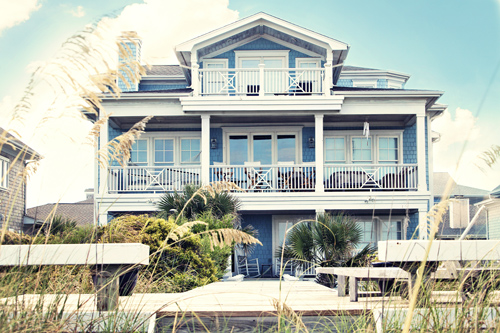

Published: July 2019
Author: Bank of England Mortgage Staff
 According to Money Magazine, now is the time to purchase if you’re considering a second or vacation home. Across the country, prices are near or below their five-year lows. In Vail, Colorado, home prices are down 30% from their highs. Pebble Beach, perhaps the most renowned golf area in the U.S., has seen a decrease of 36.3% in square-foot prices compared to five years ago. And prices in Orlando, Florida, home of the Walt Disney World theme park, are down more than 50% from their highs.
According to Money Magazine, now is the time to purchase if you’re considering a second or vacation home. Across the country, prices are near or below their five-year lows. In Vail, Colorado, home prices are down 30% from their highs. Pebble Beach, perhaps the most renowned golf area in the U.S., has seen a decrease of 36.3% in square-foot prices compared to five years ago. And prices in Orlando, Florida, home of the Walt Disney World theme park, are down more than 50% from their highs.
Will prices go lower? It’s impossible to tell, but Stan Humphries, chief economist at Zillow, says, “It’s a fool’s errand to try to time the bottom for both economists – and buyers and sellers. If you find a house that you love and want to be in for a long period of time, now is potentially a good time to wade into the market.”
Whether you’re a skier who loves the mountain slopes of Colorado or Utah, a lover of the beaches of Southern California and Florida, or a potential retiree seeking to escape the snow-laden Northeast for the wide open, sunny lands of Arizona or South Texas, there are homes available to meet a wide range of budgets. The same benefits of home ownership apply to the owner of a condominium in Boston, or a mansion at the Homestead in Hot Springs, Virginia.
1. Long-Term Profits
While all assets fluctuate in value in the short term, vacation properties are more likely to retain their value and appreciate simply because they are located in popular areas with a geographically limited supply. There is a finite shoreline or mountain on which houses can be built, and only 18 holes on a golf course.
But real estate, like stocks, bonds and other investments, has always fluctuated in value and will likely continue to do so in the future. Therefore, be aware that there is no guarantee that a second home will sell for a higher price in the future.
2. Tax Deductions
Many people who own second homes prefer to keep them unoccupied when not being used for personal enjoyment. If you allow and charge rent for occupancy for no more than two weeks per year, the interest on the mortgage and the property taxes are fully deductible from your gross income. In other words, for tax purposes, you can treat this mortgage the same way you would the mortgage on your primary residence.
3. Rental Income
If you decide to rent your home, but personally use the property as well, you’ll need to determine whether you’re eligible to deduct operating expenses. To determine this, add up the days you rented the property. If you occupied the property fewer than 10% of the days you rented it or for less than two weeks – whichever is greater – you can deduct all of the operating expenses of the home including interest, utilities, cleaning fees, lawn maintenance, and management fees. If you need help determining what you’re eligible to deduct, contact a tax professional or review IRS Publication 527 on vacation rentals.
Rental fees vary according to seasons and the popularity of the resort location. For most resorts, peak season weekly rental fees are usually equal to or greater than the property’s monthly mortgage payment, allowing you to break even with an annual occupancy around 30% from a cash flow viewpoint.
4. Familiarity
Returning to the same place time and after time can be comforting as you become familiar and comfortable with the location. It allows you the freedom to be yourself and the opportunity to expand long-term friendships with residents – you can become part of the social fabric.
5. Convenience
The ability to conveniently store items that are used exclusively at the second home simplifies travel and packing. My family’s ski paraphernalia, along with extra winter clothes, was stored at our house in Breckenridge, Colorado, allowing us to easily make unscheduled trips for a weekend of skiing without the hassle of packing or worrying if our skis would arrive on the same airline flight.
6. Retirement Head Start
Though we may love the places where we work and live, every place has its drawbacks. If you live in Texas, for example, the summers of 100-plus-degree temperatures are brutal. People in Chicago, Philadelphia, and other northern cities often hate the annual struggle with snow.
A common goal of retirement is to have a place of retreat for the times of the year we dislike the most at our main residence. Locating and buying a second home prior to retirement enables you to experience the benefits of a refuge before actual retirement, a time to correct and amend your plans if the reality is different than the dream.
7. Location for Gatherings
Places stir memories of people, relationships, and good times. As a member of a large extended family, I’ve always enjoyed the annual Independence Day gathering at my cousin’s lake house. The get-togethers started when I was a young boy when my father and his two brothers purchased a lot on a large lake in western Oklahoma, and have continued through the birth of my children and grandchildren. The annual visit has become a tradition that has kept our ever-growing family close as we spread across the region and country.
The intangible benefit of owning and passing property from generation to generation – especially a home that has been and will continue to be the site of many happy gatherings – is incalculable.
8. Access to Other Vacation Homes
Many second homes are located in areas that people like to visit – resorts, golf courses, mountains, seashores – and their attraction is universal. As a result, owners in one location often arrange to trade time in their house for time in a home located in another region. This is referred to as a home exchange.
The purchase of a home, whether a primary residence or a vacation spot, can be a complicated process and a significant financial commitment. However, by following the proper steps, you can make the experience as painless as possible.
1. Determine Your Ideal Location
Resort areas usually have a wide range of properties to fit a variety of budgets. The greater the area you’re willing to consider, the more likely you are to find a property that fits your own budget. Do you, for example, have to live on the ocean or on a specific mountain slope, or would you be willing to drive to the beach or ski lift?
2. Establish a Price Range
Owning a second home should be pleasurable, not the source of constant financial strain. For purposes of a price range, assume that your down payment, closing costs, and furnishing will be 33% of the purchase price. In other words, if you have $50,000 in cash, your beginning price range should be between $130,000 and $170,000.
3. Engage a Local Realtor
The assistance of a local real estate agent is invaluable during your search for the vacation home of your dreams. A good agent can guide you through the purchase process, help you find mortgage financing, and may be able to manage the property when you’re away. Even if you’re purchasing a fractional interest from a real estate developer, the Realtor may help you get a better deal.
Bank of England Mortgage's Vacation-Second Home Mortgages offer a broad array of fixed, adjustable, and interest-only options. We work together with our clients to identify the ideal mortgage for your vacation home.
Get your Bank of England vacation home mortgage loan and make your dreams a reality - backyard barbeques and sunsets by the lake. Fun-filled relaxing fishing trips with children and grandchildren. Exciting family skiing vacations. A lifetime of memories.
Source: https://www.moneycrashers.com/buying-second-vacation-home/